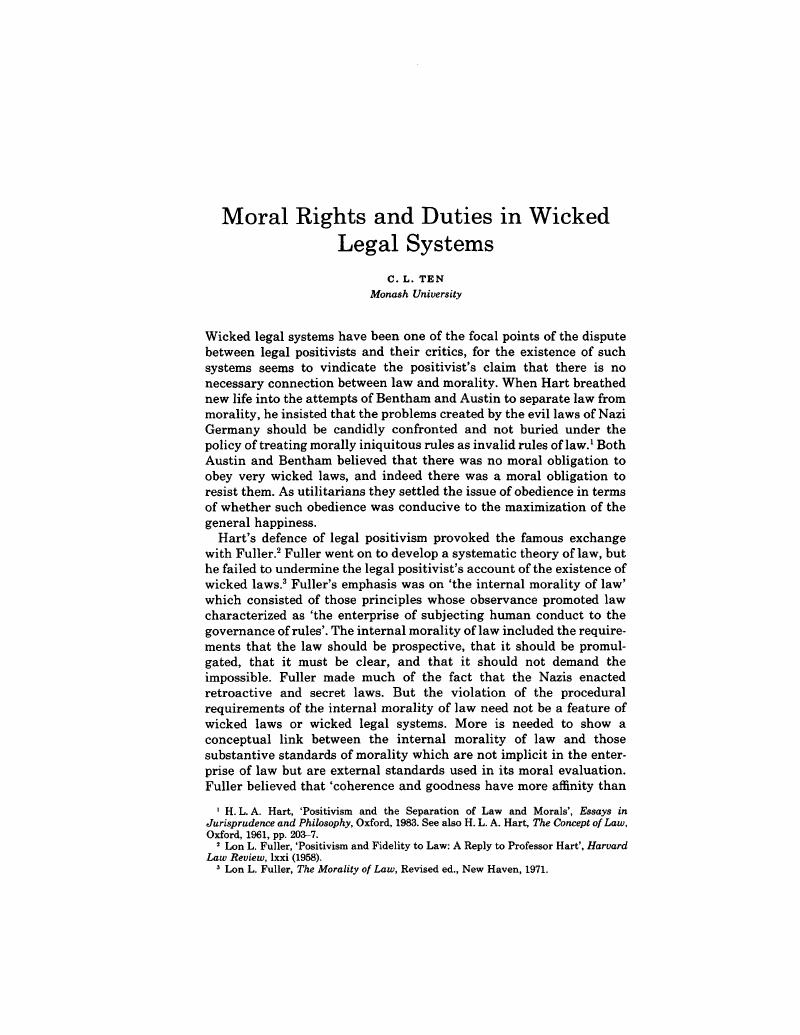No CrossRef data available.
Published online by Cambridge University Press: 26 January 2009

1 Hart, H. L. A., ‘Positivism and the Separation of Law and Morals’, Essays in Jurisprudence and Philosophy, Oxford, 1983CrossRefGoogle Scholar. See also Hart, H. L. A., The Concept of Law, Oxford, 1961, pp. 203–7.Google Scholar
2 Fuller, Lon L., ‘Positivism and Fidelity to Law: A Reply to Professor Hart’, Harvard Law Review, lxxi (1958).Google Scholar
3 Fuller, Lon L., The Morality of Law, Revised ed., New Haven, 1971.Google Scholar
4 Fuller, , ‘Positivism and Fidelity to Law’, 636Google Scholar. See also Fuller, , Morality of Law, ch. 4Google Scholar, and Hart's comments in Hart, H. L. A., ‘Lon L. Fuller: The Morality of Law’, Essays in Jurisprudence and Philosophy, pp. 351–3.Google Scholar
5 Hart, , ‘Positivism’, p. 74.Google Scholar
6 Fuller, , ‘Positivism and Fidelity to Law’, 659.Google Scholar
7 Dworkin, Ronald, Taking Rights Seriously, New Impression, London, 1984, esp. ch. 3 and pp. 338–53.Google Scholar
8 Hart, H. L. A., ‘Legal Duty and Obligation’, Essays on Bentham, Oxford, 1982, p. 151Google Scholar. See also Hart, H. L. A., ‘Legal Theory and the Problem of Sense’, Issues in Contemporary Legal Philosophy: The Influence of H. L. A. Hart, ed. Gavison, Ruth, Oxford, 1987, pp. 40–2.Google Scholar
9 Dworkin, Ronald, ‘A Reply by Ronald Dworkin’, Ronald Dworkin and Contemporary Jurisprudence, ed. Cohen, Marshall, Totowa, 1984, pp. 256–60.Google Scholar
10 For an interesting discussion of the view that not all obligations are moral obligations, see Sartorius, Rolf E., Individual Conduct and Social Norms, Encino, 1975, ch. 5.Google Scholar
11 Dworkin, , ‘A Reply’, p. 259.Google Scholar
12 Dworkin, Ronald, Law's Empire, London, 1986, esp. pp. 101–8Google Scholar. See also Dworkin, , ‘Legal Theory and the Problem of Sense’.Google Scholar
13 Dworkin, , Law's Empire, pp. 178–84.Google Scholar
14 Ibid., p. 106.
15 Ibid., p. 105.